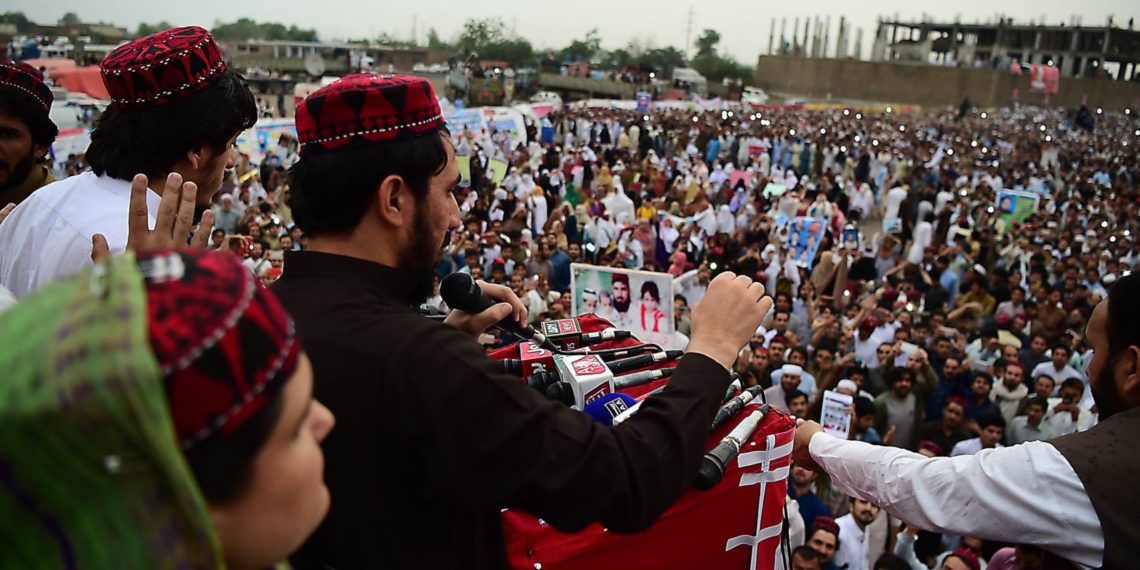The Resilient Voice of Pashtun Tahafuz Movement: A Struggle for Justice and Dignity (Also Me)
Manzoor Pashteen, a young human rights activist, has become the face of the Pashtun Tahafuz Movement (PTM), a powerful social movement advocating for justice and dignity for the Pashtuns in Pakistan. In a region marred by conflict and historical complexities, Pashteen's journey from a small village in South Waziristan to the forefront of a national movement reflects the struggles and aspirations of his people.
Manzoor Pashteen: A Beacon of Hope in South Waziristan
Born in 1994, Pashteen hails from the Mahsud tribe in South Waziristan, an area deeply entrenched in the war on terror. Despite the challenges posed by living in a conflict zone, Pashteen's father, a primary school teacher, was unwavering in his determination to provide an education for his son. Pashteen's early years were marked by fleeing military operations, but he persisted in his education, eventually graduating in veterinary medicine from Gomal University in 2016.
The Birth of an Activist: A Call for Change in 2014
Pashteen's journey into activism began in 2014 when he founded the Mahsud Tahafuz Movement, aimed at removing landmines from Waziristan, which had caused significant harm to civilians. The movement also highlighted the plight of internally displaced persons (IDPs) affected by military operations. Pashteen's commitment led to peaceful protests demanding basic rights and services for the Pashtuns in tribal areas.
The movement gained national and international attention in 2018 after the extrajudicial killing of Naqeebullah Mehsud, sparking accusations against the police and demands for accountability. Pashteen and his supporters launched the Pashtun Long March, renamed PTM, to address broader issues affecting the Pashtun population.
PTM's Demands: A Call for Justice and Rights
End Extrajudicial Killings and Abuses: Stop extrajudicial killings, enforced disappearances, and collective punishments by security forces and militants against the Pashtun population.
Recovery and Fair Trial: Ensure the recovery and fair trial of missing persons, avoiding arbitrary detentions and addressing accusations through legal channels.
Clearance of Landmines: Remove landmines and unexploded ordnance from tribal areas, compensating victims and their families.
Truth and Reconciliation Commission: Establish a truth and reconciliation commission to investigate and acknowledge human rights violations against Pashtuns over the past four decades.
Constitutional and Legal Rights: Implement the constitutional and legal rights of Pashtuns, covering life, liberty, property, education, health, and representation.
Demilitarization: Demilitarize tribal areas, promoting peace and stability in the region.
State Response: A Complex Interplay of Support and Opposition
The PTM has faced staunch resistance and repression from the state and its allies. Leaders and activists have been subject to arrests, harassment, intimidation, and attacks. Rallies and gatherings have been banned or dispersed, with supporters labeled as anti-state or foreign agents. Accusations of foreign influence, particularly from India, Afghanistan, or the West, aim to undermine the legitimacy of the movement.
However, the PTM has garnered support from civil society, human rights groups, political parties, and ordinary citizens in Pakistan. The movement has also received international acclaim, especially from the Pashtun diaspora, for its peaceful and democratic pursuit of justice.
Future Challenges for PTM: Balancing Act and Dialogue
As the PTM stands at a critical juncture, it faces mounting pressure from the state while confronting internal and external challenges. Maintaining unity and momentum, expanding outreach, and navigating internal dynamics become imperative for the movement's sustainability.
Balancing radical and reformist tendencies, and ethnic and national identities, remains crucial to prevent co-optation or isolation by dominant forces. Engaging in constructive dialogue with the state and stakeholders, while upholding principles and demands, is vital for realizing the PTM's goals.
PTM: A Phenomenon Shaping Pakistan's Narrative
The PTM is more than a movement; it is a phenomenon challenging power structures in Pakistan. It symbolizes the collective conscience and aspirations of the Pashtuns and other marginalized groups. The struggle goes beyond a quest for rights; it encapsulates hope, inspiring individuals to courageously fight for their dignity.
In the face of adversity, the PTM remains a beacon of resilience, shaking the status quo and transforming the narrative of the Pashtuns and Pakistan. It is a testament to the power of peaceful advocacy in the pursuit of justice and human rights. As Pashteen and the PTM continue their journey, they redefine the contours of activism, leaving an indelible mark on the socio-political landscape of Pakistan.
Peace Out

Comments
Post a Comment